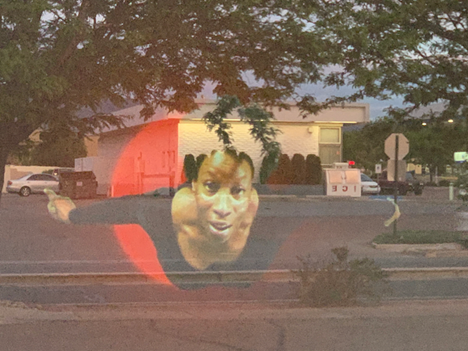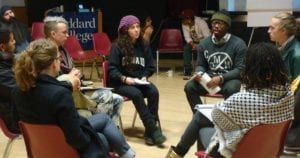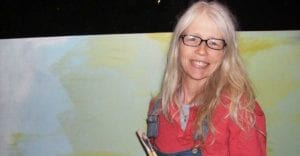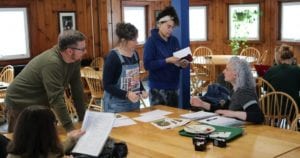
By Patricia Connelly
The Whole is Greater Than the Sum of its Parts–A Two-Part Blog
At one of our group advising meetings during the June residency in Vermont, Deborah Brevoort suggested we all read one or two of the same works during the semester and annotate them at the same time. The idea was that we would choose the works as a group, share our annotations within the group, and discuss the work online. Brevoort asked for choices that were political and/or controversial, something that would generate spirited discussion. I suggested The Admission, a play by Motti Lerner, a preeminent Israeli playwright, screenwriter and television writer as well as a teacher and lecturer on Israeli theatre and the Israeli-Palestinian conflict. The advising group seemed excited about the play and voted in favor of it as one of our group annotations. We then got in touch with playwright Lerner who graciously offered to participate in our online discussion.
The Admission is about an Israeli man trying to discover the truth about the killing of Palestinian civilians in a small village by Israeli soldiers during the 1948 Arab-Israeli war. The play had been produced in 2014 in Washington, D.C., first at Theatre J and then at Studio Theatre. There had been a heated public debate between a local ad hoc group called “Citizens Opposed to Propaganda Masquerading as Art” and Theater J. The group campaigned to stop Theater J’s presentation of the play and tried to dissuade donors from contributing to the Jewish Federation of Washington, which contributes to the Washington, D.C. Jewish Community Center (“DCJCC”) where Theater J is housed. In the end, the group was successful in pressuring the DCJCC to limit the presentation to a workshop and to decrease the number of performances. A local donor and supporter funded the full production at Studio. But Ari Roth’s decision to produce and defend the play ultimately cost him his job as Artistic Director of Theater J.
The Group Annotation
There were six of us in the group: Phyllis Davis, Amanda Higgins, Wayne Jackson, Lindsay Palmer, Darlene Prickett and me. Not surprisingly, each person looked at a different aspect of the play. Collectively, we analyzed both the writing and the larger issues underlying the compelling family drama. We noted how Lerner hooks the audience in the first scene with a surprising violent act — a stabbing — during a shared meal between two patriarchs, one Arab and one Israeli. We considered Lerner’s use of buried bones as a metaphor for burying the truth. Some of us discussed the complexity of Lerner’s characters and their complicated relationships to each other. One person focused on the guilt underlying the main character’s drive for the truth, and a few of us looked at the overarching political issues built into the play. Taken together, the six annotations provided a rich analysis of the play.
I enjoyed our discussions about how he came to write this play and how we all could relate to the themes we uncovered in it. —Darlene Prickett
Lerner’s book, The Playwright’s Purpose, provided a deeper understanding of the playwright and his intention. In the book, Lerner discusses his belief that the playwright’s tool to transform audience and society is the Aristotelian concept of catharsis. For him, “the most potent and most efficient tool in the hands of the playwright to affect the spectator is the catharsis. I believe that if we want to create a change within our spectators we must lead them through a process of catharsis that will initiate this change.”
For playwrights with purpose, the protagonists they create are relentless and unyielding. By creating empathy with the protagonist, the playwright can motivate the desire in the audience to take on the protagonist’s cause in their own lives after the protagonist has tragically failed in the play.
With all of this in mind, we formulated our questions for Lerner and began the discussion.
Online Discussion With the Playwright
Brevoort led off the discussion by introducing the group to Lerner and providing her initial reactions to both the play and the book. One by one, each of us joined what became an inspiring lesson and an invaluable opportunity to delve more deeply into the play and the mind of the playwright. In addition to the obvious political questions the play raises, we had the opportunity to ask Lerner about his development of characters, their relationships to each other, the origins of the play, and choices he made in structuring the play. In return, Lerner had a question for us. He wanted to know how much we each knew about the Israeli-Palestinian conflict before we read the play and whether we needed to do research. Lerner also shared with us the fact that his relationship with his protagonist, Giora, is special because he represents Lerner’s own personal struggle.
Talking with playwright Motti Lerner was an uplifting experience. I appreciated his kindness in engaging with writers who are creating new voices in playwriting, screenwriting and novel writing. –Phyllis Davis
In the end, the discussion covered a wide range of issues. It included, the universal issues of the play, i.e., the pain of war and how we deal with the scars and memories they leave from one generation to the next. People drew parallels between the Israeli-Palestinian conflict to other conflicts in the world and other wars, including: World War II, the bombing of Hiroshima and Nagasaki, the Korean War, the Vietnam war and 9/11. We could not discuss the larger issues, however, without looking at the family relationships as well as the conflicts within and between the families. When one person noted how deeply held secrets can destroy a family, Lerner pointed to the influence of Arthur Miller’s All My Sons on his writing and drew a comparison. In addition to Miller, he also noted the influence of other playwrights including: Shakespeare, Chekhov, Ibsen and Strindberg. Always underlying the discussion, however, was the question of the writer in the world and the writer’s responsibility to tell the truth as he or she sees it, to initiate discourse, no matter what the consequences. For Lerner, his play has yet to be produced in his own country.
Speaking with Motti Lerner was an interesting and informative experience that gave us valuable insight into the construction of his work.–Lindsay Palmer
Lerner had sent us the text of a talk he gave at a conference in France on political theater in Israel in France a few months earlier, The Israeli-Palestinian Conflict – the Challenge for the Israeli Theater. In the talk, Lerner fully described how the idea for the play originated and his process in the writing and development of the play, including the debate over the production in Washington and the obstacles he has faced in Israel in trying to get his work produced. Nevertheless, he remains hopeful for a production in Israel when the political climate allows. In the meantime, Mosaic Theater Company, Roth’s new theater in Washington, D.C. will be producing Lerner’s new play, After the War. Like his central character, Giora, in The Admission, Lerner is the relentless protagonist of his own story.
My talk with Mr. Lerner made me think about the impact I have on the world around me.–Wayne Jackson
Next Wednesday: Part Two: Motti Lerner’s speech, edited by Patricia Connelly:
The Israeli-Palestinian Conflict – The Challenge for the Israeli Theater
A talk by Motti Lerner at the conference: “Political Theater in Israel”
Strasbourg University, April 16, 2015







